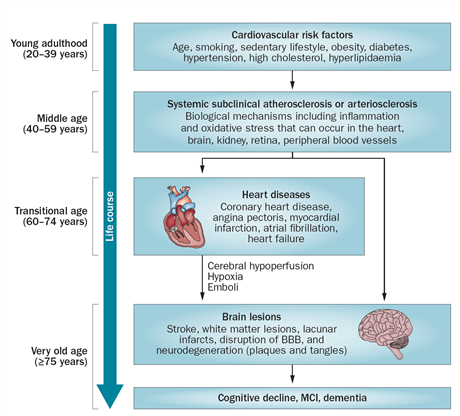Find the PhD here
Background and Research Question
With increased longevity in the western world, dementia becomes an increasing economic burden for the society. In Denmark, close to 40.000 individuals are diagnosed with dementia[1]. Furthermore 60% of individuals with dementia are undiagnosed, so the actual number of affected is closer to 100.000[1]. The direct costs of treatment are estimated at about ten billion DKK., but the indirect costs are much higher.
A major problem is early recognition of dementia as early signs are discrete with only minor cognitive impairment. Cardiovascular diseases predispose to cognitive impairment and dementia[2] as reduced cardiac output will lead to cerebral hypoperfusion which makes the brain more prone for dementia development. Furthermore any cardiovascular risk factor[3] is also a risk factor for dementia (Figure 1, taken from reference 2). This includes the genetic risk factor apolipoprotein E (apoE) ε4, as well as plasma levels of apoE, indicating shared pathways in development of dementia and cardiovascular diseases.

(Figure 1)
Electrocardiography (ECG) is the standard initial test for cardiac examination. The cost of electrocardiography is low, and most citizens in Copenhagen has previously been tested with digital ECG, allowing for analysis and risk prediction, even in cases where dementia originally was not the reason for the test.
It is well known that arteriosclerosis predisposes to dementia as well as ECG changes. Recently, it has been shown that arrhythmias, especially supraventricular arrhythmias are risk factors of dementia independent of arteriosclerosis[4], which rises the hypothesis that ECG markers could be used as predictors for development of dementia. To our knowledge only one study has addressed the value of ECG markers to predict the need of support or nursery home admittance[5]. However, Okuno only investigated ischemic ECG markers, so the impact of baseline ECG changes for future development of dementia are completely unknown and the study was small with only 1000 subjects.
Since ECG is a cheap clinical test which is routinely performed in a large part of the population, it may be feasible to identify markers to allow personalized risk stratification for later development of dementia. Our research question is whether the ECG alone or in combination with genetic markers can be used to identify citizens at increased risk for dementia to target intervention.
Results and Innovation Potential
With this project, we want to identify personalized risk markers from ECG signal analysis, which may be used either alone or in combination with blood test to identify at-risk individuals. The goal is targeted intervention could help avoid or delay institutionalization. The present study will show whether a later large-scale intervention in high-risk groups are feasible ethically and economically. Future prospects are that the features identified may be used dynamically to identify development of dementia.
References
- Nationalt Videncenter for Demens. 2018.
- Qiu C and Fratiglioni L. A major role for cardiovascular burden in age-related cognitive decline. Nat Rev Cardiol. 2015;12:267-77.
- Wolters FJ, Segufa RA, Darweesh SKL, Bos D, Ikram MA, Sabayan B, Hofman A and Sedaghat S. Coronary heart disease, heart failure, and the risk of dementia: A systematic review and meta-analysis. Alzheimers Dement. 2018.
- Dagres N, Chao TF, Fenelon G, Aguinaga L, Benhayon D, Benjamin EJ, Bunch TJ, Chen LY, Chen SA, Darrieux F, de Paola A, Fauchier L, Goette A, Kalman J, Kalra L, Kim YH, Lane DA, Lip GYH, Lubitz SA, Marquez MF, Potpara T, Pozzer DL, Ruskin JN, Savelieva I, Teo WS, Tse HF, Verma A, Zhang S, Chung MK, Bautista-Vargas WF, Chiang CE, Cuesta A, Dan GA, Frankel DS, Guo Y, Hatala R, Lee YS, Murakawa Y, Pellegrini CN, Pinho C, Milan DJ, Morin DP, Nadalin E, Ntaios G, Prabhu MA, Proietti M, Rivard L, Valentino M and Shantsila A. European Heart Rhythm Association (EHRA)/Heart Rhythm Society (HRS)/Asia Pacific Heart Rhythm Society (APHRS)/Latin American Heart Rhythm Society (LAHRS) expert consensus on arrhythmias and cognitive function: What is the best practice? J Arrhythm. 2018;34:99-123.
- Okuno T, Watanabe K, Nakajima K, Iritani O, Yano H, Morita T, Himeno T, Igarashi Y, Okuro M and Morimoto S. Major electrocardiographic abnormality predicts support/care-need certification and/or death in community-dwelling older adults with no history of cardiovascular disease. Geriatr Gerontol Int. 2017;17:1967-1976.